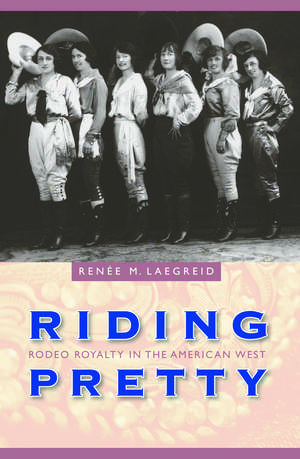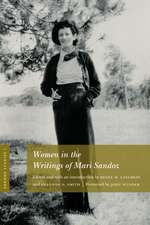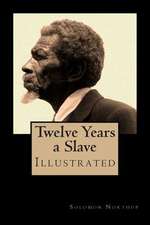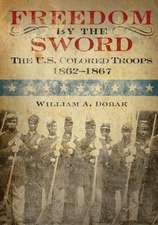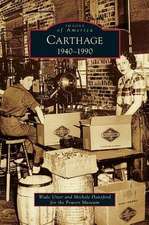Riding Pretty: Rodeo Royalty in the American West: Women in the West
Autor Renée M. Laegreiden Limba Engleză Hardback – oct 2006
When the town of Pendleton, Oregon, held its first large-scale rodeo, it introduced a new kind of rodeo queen—not a traveling cowgirl performer but a young, middle-class woman from its own town. Riding Pretty examines the history, evolution, and significance of the community-sponsored rodeo queen, from the introduction of this new phenomenon at the 1910 Pendleton Round-Up to the advent of Miss Rodeo America in 1956, and places the main theme—connection of queens to community—within the context of the evolution of rodeo as a spectator sport and the changing concepts of gender relations in the American West.
The model for community-sponsored rodeo queens that originated in Pendleton gradually spread to other rodeos throughout the West, giving young women the opportunity to participate both in rodeo and in their communities. From 1910 to 1956, the community-sponsored rodeo queen’s role expanded, both in terms of her responsibilities and in terms of the community she represented, local, regional, and national. While each community adapted the rodeo queen phenomenon to suit the characteristics of its own celebration, the main characteristics of the role remained: the rodeo queen as a symbol of the local rodeo and as a metaphor for western women.
The model for community-sponsored rodeo queens that originated in Pendleton gradually spread to other rodeos throughout the West, giving young women the opportunity to participate both in rodeo and in their communities. From 1910 to 1956, the community-sponsored rodeo queen’s role expanded, both in terms of her responsibilities and in terms of the community she represented, local, regional, and national. While each community adapted the rodeo queen phenomenon to suit the characteristics of its own celebration, the main characteristics of the role remained: the rodeo queen as a symbol of the local rodeo and as a metaphor for western women.
Din seria Women in the West
-
 Preț: 119.58 lei
Preț: 119.58 lei -
 Preț: 110.08 lei
Preț: 110.08 lei -
 Preț: 156.70 lei
Preț: 156.70 lei -
 Preț: 127.46 lei
Preț: 127.46 lei -
 Preț: 100.20 lei
Preț: 100.20 lei -
 Preț: 110.32 lei
Preț: 110.32 lei -
 Preț: 97.94 lei
Preț: 97.94 lei -
 Preț: 100.59 lei
Preț: 100.59 lei -
 Preț: 105.34 lei
Preț: 105.34 lei -
 Preț: 105.77 lei
Preț: 105.77 lei -
 Preț: 113.82 lei
Preț: 113.82 lei -
 Preț: 149.17 lei
Preț: 149.17 lei -
 Preț: 101.65 lei
Preț: 101.65 lei -
 Preț: 135.25 lei
Preț: 135.25 lei -
 Preț: 223.07 lei
Preț: 223.07 lei -
 Preț: 366.16 lei
Preț: 366.16 lei -
 Preț: 147.84 lei
Preț: 147.84 lei -
 Preț: 287.26 lei
Preț: 287.26 lei -
 Preț: 328.52 lei
Preț: 328.52 lei -
 Preț: 181.86 lei
Preț: 181.86 lei -
 Preț: 145.17 lei
Preț: 145.17 lei -
 Preț: 127.23 lei
Preț: 127.23 lei -
 Preț: 109.76 lei
Preț: 109.76 lei
Preț: 165.40 lei
Nou
Puncte Express: 248
Preț estimativ în valută:
31.65€ • 33.84$ • 26.39£
31.65€ • 33.84$ • 26.39£
Carte disponibilă
Livrare economică 28 martie-11 aprilie
Preluare comenzi: 021 569.72.76
Specificații
ISBN-13: 9780803229556
ISBN-10: 0803229550
Pagini: 276
Ilustrații: Illus., maps
Dimensiuni: 140 x 216 x 15 mm
Greutate: 0.51 kg
Editura: Nebraska
Colecția University of Nebraska Press
Seria Women in the West
Locul publicării:United States
ISBN-10: 0803229550
Pagini: 276
Ilustrații: Illus., maps
Dimensiuni: 140 x 216 x 15 mm
Greutate: 0.51 kg
Editura: Nebraska
Colecția University of Nebraska Press
Seria Women in the West
Locul publicării:United States
Notă biografică
Renée M. Laegreid is an assistant professor of history at Hastings College.
Recenzii
"Laegreid offers an interesting case study of how some women negotiated the boundaries of gender and sometimes even race within the mythic US West."—Choice
“Laegreid does a solid job of presenting the rodeo queens, often the daughters or friends of influential white families, as a force, if only briefly, in the emergence of community. . . . Riding Pretty pushes readers to consider unusual questions about western women and the choices some of them made for carving a space within the world of rodeo.”—Anne M. Butler, Oregon Historical Quarterly
"This book fills an important place in the growing field of rodeo studies, a subfield of western history pursued by historians, economists, cultural anthropologists, folklorists, and gender and sports studies scholars. Renee M. Laegreid has produced a well-written, well-documented history."—Michael Allen, Journal of American History
